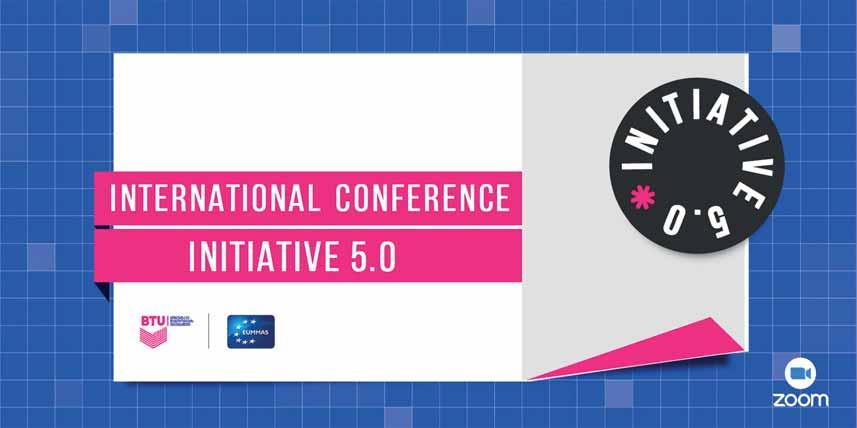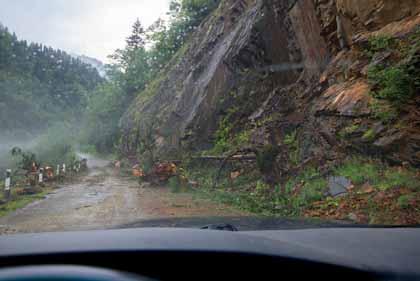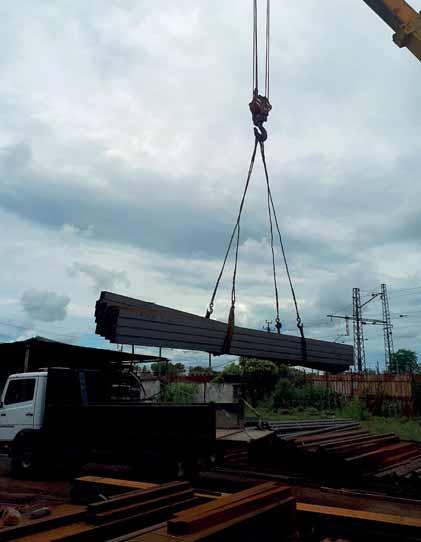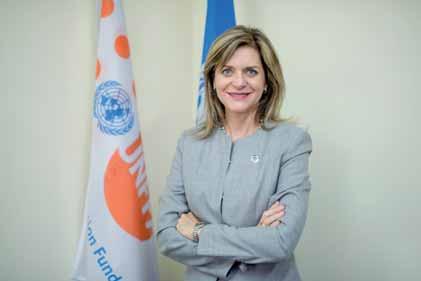
15 minute read
SOCIETY
from Issue #1304
TRANSLATED BY ANA DUMBADZE
Advertisement
On July 2, the University of Business and Technology (BTU), in partnership with the European Marketing and Management Association (EUMMAS) Academic Consortium, hosted an international conference ‘Initiative 5.0 - Digital Economy and Pandemic.’
The conference was attended by researchers from BTU and partner international universities, representatives of the public and private sectors, members of local and international associations and organizations, and other stakeholders. At the event, research presentations were conducted by researchers from local and international universities.
Welcome speeches were delivered by BTU Rector Nino Enukidze and Prof. Dr. Mile Vasic, EUMMAS President.
The following research presentations were delivered by BTU professors and foreign researchers: ‘Opportunities and Challenges of Digital Foreign Policy’ - Khatuna Burkadze, Affi liate Professor at BTU; ‘Green Energy Opportunities - Business Model’ - Maia Melikidze, Affi liate Professor at BTU; Research: ‘Women in Tech: A Saga, Femtech and a Bright Future’ - Mariam Lashkhi, Affi liate Professor at BTU; Research: ‘Barriers and Challenges to the adoption of E-Health in Georgia’ - Nino Mikava, Affi liate Professor at BTU; Research: ‘Complementarity Perspective of Entrepreneurship Ecosystem’ - Ani Vashakmadze, Affi liate Professor at BTU; Research: ‘Digital Trust Forming Process in Georgia’ - Tsotne Jgenti, Affi liate, Professor at BTU; Research: ‘Formation of Capital Market in Georgia and its Integration Opportunities into International Financial Markets’ - Vakhtang Chkareuli, Associate Professor at BTU; Research: ‘Promoting a Startup Ecosystem in Georgia, Startup Status and Its Legal Regulation’ - Lado Sirdadze, Associate Professor at BTU; Research: ‘Have female entrepreneurs done better in COVID-19?’ - Maksim Belitski, Associate Professor in Entrepreneurship and Innovation, University of Reading (UK); Research: ‘Green Corrosion Inhibitors for Offshore Oil and Gas Structure’ - Casen Panaitescu, Lecturer, Head of International Relations Offi ce, Petroleum-Gaz University of Ploiesti (Romania); Research: ‘Impact of Social Media on the Higher Educational Sector with Reference to Indian Context’ - Shanmugan Joghee, Associate Professor, School of Business, Skyline University College (UAE); Research: ‘A Novel Approach to Conducting Business research after Covid-19: Incorporating Crisis Elements in the Study Frameworks’ - Pranav Kumar, Professor, Skyline University College (UAE); Research: ‘Implementation of Digital Enabling Technologies in the Manufacturing Industry’ - Manuel Rios de Haro, Professor, University of Granada (Spain); and Dzintra Atstaja (Professor), Liga Atstaja (Mg.), Didzis Rutitis (Dr.) - BA School of Business and Finance (Latvia): ‘Cybersecurity Risks and Challenges in Remote Work under the Covid-19 Pandemic.’
The aim of the conference was to share international expertise and the latest trends, achievements or research results in all sectors that contribute to the development of the digital economy and digital governance in Georgia.
Based on the University of Business and Technology Strategic Development Plan, the University aims to participate in the development of Georgia's digital economy, integrate technology into various business sectors, promote sustainable development, and support the country's innovative ecosystem. To implement this plan, the University initiated Project 5.0, which integrates strategically important sectors for the country in the form of various studies, projects and events. These areas are: FEMTECH, MEDIATECH, LAWTECH AND LEGALTECH, FINTECH, EDTECH, AGRITECH, CULTURETECH, HEALTHTECH, GREENTECH, ENTREPRENEURSHIP.
Are We Seriously Losing Our Chance at Westernization?
OP-ED BY NUGZAR B. RUHADZE
The LGBTQI life has both supporters and opponents in this country. Abortion has the same status, and feminism too, for that matter. The rest of the world is more or less balanced in this regard, by which I mean, people are not using their fi sts in their struggle to achieve goals, whatever those goals might be: They just use their tongues when they intend to put forward their principles and ideas. Here in Georgia, we don’t talk. We go physical forthwith when we are offered something that is not very much to our liking. I’ll try to explain it by means of analyzing our national oversensitive nervous system.
We are herewith talking about the supporters of the Pride Movement in Georgia and their opponents. The Pride activists try to hold parades here once a year, in order to remind society that they want to enjoy life and human rights exactly as other people do, and they undoubtedly have reason for this. Throwing in the encyclopedic defi nition, a pride parade is an outdoor event celebrating lesbian, gay, bisexual, transgender, nonbinary and queer social and self-acceptance, achievements, legal rights, and pride.
We saw rather large crowds of people in the streets of Tbilisi over the last few days, either for or against the parade, but I strongly suspect that many of the supporters and opponents of the Pride Parade, including the journalists, don’t have even the slightest clue of how the English word ‘pride’ translates into Georgian, which means that they place themselves for or against something, despite the content not being completely clear to them. This sounds like one of my little jokes but, you know, every joke has a grain of truth to it. And the grain is that some of us, be we LGBTQI supporters or opponents, need to be a little better versed in the roots of the situation. Nothing is simple here in Georgia. We are living in a totally different world compared to what we witnessed 30-40 years ago. Human life and our ability to reason about it has been drastically accelerated by electronic information fl ow, within which we often get lost, not being able to tell right from wrong, or to answer questions like how much humankind in general gains from either supporting or opposing a small bunch of people who are only trying to tell the world that they don’t mean any harm; that, if nature calls, then the human effort to ignore that call is futile, so let them be who they are and want to be.
But every coin has a fl ipside. The story of humanity is long and complicated, and has accumulated certain stereotypes which are not easy to overcome as quickly as that, and there are people who want to continue living those stereotypes. The question is, do they also have the right to be that way? Perhaps novel attitudes and renovated interpretations of very old human habits and ways of life need to be introduced more gradually than is being done in our accelerated times!
The situation is highly contradictory, but there is one undeniable truth about it. In our times of runaway spiritual and electronic development, violence has become totally irrelevant, and it is high time for all of us on our beautiful earth to substitute violence in general with something that is more humane, and that is, of course, intelligent discourse.
Things like Human Rights, LGBTQI Life and Pride Parades are all Western phenomena, vigorously and hastily being planted nowadays in the Eastern world. The notion of the West is mostly associated with tolerance, patience, and benevolence towards anything that is innate to Homosapiens, but Westernization cannot happen quickly. It is a painful process and it needs a lot of education and understanding to be applied. Awareness of this might not be a universal panacea, but it could at least keep us safe from bruised faces and death threats.

JULY 9 - 15, 2021 SOCIETY
9 Shopping for a Storm: Svaneti

BLOG BY TONY HANMER
We were expecting 18 guests from Poland, and at last had also managed to fi nd a local helper for the guest house. Being a widow, she had no husband to ask permission of, with the likely answer a refusal of what might be perceived as less than honorable work somehow. Her children are all but one no longer “in the nest”, and the remaining boy is independent enough that he could fend for himself for most if not all of a day. So she said yes, and proved to be valuable help indeed.
She and my wife did all the cooking, after drawing up a menu for supper and breakfast, nice and varied with many of the classic Georgian or Svan dishes. I helped as I could with getting beds and the space upstairs ready, as well as fi nishing the emptying out of two rooms downstairs which the shop’s overfl ow had taken over. It’s a big house, but there is only so much room. We expected our guests at the usual time of late afternoon, all together in one specially ordered minivan-bus.
However, things turned interesting once all the cooking was (most mercifully) fi nished. The electricity went off. This happens more frequently than one would like to admit up here, but it is free of charge in Mestia region, so we generally don’t complain. However, twilight was beginning to fall and we couldn’t reach our guests by cell phone. This usually means that they are in one of the off-footprint areas about 20 km below us, where there are no villages nearby and no coverage. So we hoped that they would arrive soon. Meantime, we gathered the candles, solar garden lights and fl ashlights which we had, to be ready.
It was 10:30 that night before the minivan arrived and disgorged its tired company into our darkness. We got everyone inside and soon they were eating heartily and telling us what had happened.
There had been quite a storm, and trees had blocked the road near Khaishi, normally about an hour’s drive below us. There they waited for about three hours for cutting crews to come and clear a path just wide enough for a single vehicle to pass. Glad to be safe and secure at last, they wrapped up at about midnight and we washed up as best we could in the dimly lit dark.
The next morning, I had to leave at 7 for Zugdidi in my 4x4 to shop for building materials for the café which we won an EU grant for last fall and are making near the house. Make sure you get big printed receipts for everything, my wife sternly reiterated to me, as without them we won’t get reimbursed! Cement, steel box-beams and wire, and a few odds and ends on this trip, which also would need a big truck to haul it all up on, and 450 GEL for the driver. Our new helper arrived just before I left, and I knew things were in good hands with my wife and her together.
The road down was, I think, the worst I’ve seen it outside of winter. Rock falls of all sizes from gravel to car-crusher littered the cement or asphalt in countless spots, but someone had obviously been through before me, as the whole way there was a path to carefully thread. More tree trunks too, more than I have ever known on this road, which may offer a single such occurrence at a time; but all cut to let cars through. No ordinary storm, this had been. Also, a couple of police cars and some other cars were stopped together near the edge of the Enguri hydroelectric dam, and I later found out why.
I did my shopping and returned about 10 hours after I had left. This time I was equally amazed but for the opposite reason: ALL of the debris on the road had been cleared up! The whole way! This was clearly not the work of a single crew, as there had been much too much of it. To be honest, I am generally most dissatisfi ed with the poor condition of our main road and the sloth with which it is cleared of rocks. I suppose that now we were back into full tourism season, the government wanted to make a good impression on the foreign guests. Worked for me, too.
It turned out that a man from Becho living in Khaishi had gone over the rails into the Enguri dam, thus the police, later joined by fi refi ghters. I don’t know fi rm details of the accident except that he had perished. He seems to have been the only casualty of the night’s fury, although several houses in Mestia lost their roofs. I was just glad to be back home with mission accomplished and guests well met despite the challenges. And glad that this storm was over. Peace has returned. Tony Hanmer has lived in Georgia since 1999, in Svaneti since 2007, and been a weekly writer and photographer for GT since early 2011. He runs the “Svaneti Renaissance” Facebook group, now with nearly 2000 members, at www.facebook.com/ groups/SvanetiRenaissance/
He and his wife also run their own guest house in Etseri: www.facebook.com/hanmer.house.svaneti

GeoGAP, Setting the Standards: Translating Consumer Requirements into Good Agricultural Practice
Continued from page 6
“Producing a quality and safe product will give local farmers completely new opportunities and take them to the next stage of production,” Kakha says.
“Imagine keeping harvest records that allow you to see the production process from a different angle and to focus on important details, to observe growth trends, compare results by year. Also, with the help of GeoGAP, it is easy to look at your production more broadly: to explore, to evaluate the environment where you grow the produce and to get significant results even with small improvements. Georgian farmers have a good opportunity to enter the European market and this is evidenced by the special quality and taste of our products.”

VEGETABLES FROM IMERETI
“Such quality is given to us thanks to the approaches we have learned and tested through GeoGAP,” say Shalva Kupaladze and Giorgi Kukhianidze.
Greenhouse production by Shalva and Giorgi is a new continuation of their family business, aiming to establish a special quality of Imereti herbs on the local and international market.
A few years ago, their attending a seminar of a Dutch agro-specialist opened their eyes to a new opportunity. Back home, they shared their new knowledge with their fellow villagers, and in so doing laid the foundation for a new greenhouse unity. The name also came easily to them: ‘Vegetables from Imereti,’ and its producers are especially proud of the distinctive taste, aroma and quality of their produce.
“Constant quality control is an exercise to be in good shape, for you as a manufacturer and also for your produce, which shouldn’t be purchased by a customer only once: Demand for it must be stable and growing,” Shalva tells us. “GeoGAP will teach you exactly how to achieve this goal; how to produce a safe product, and how to make this fact a special feature of your production.”
Why would you advise farmers to work towards the GeoGAP standard themselves?
“Every farmer who looks at their business from a long-term perspective should understand that the near future belongs to safe products, and that the demand for them will increase. The easiest, most experienced, and tailored way to achieve this quality is to move to production of the GeoGAP standard,” Shalva says.
BLUEBERRY DREAMS
Giorgi Zakaraia, a farmer from the Samegrelo region, has been running a blueberry plantation since 2018. Currently, the plantation is spread over 9 hectares of land. It is a family business in which Giorgi’s parents and wife are also involved.
After living abroad for almost 20 years, Giorgi returned to his homeland, and instead of choosing a job in public service in Tbilisi, he decided to get involved in agriculture. Initially, he ran a hazelnut plantation in Samegrelo, however, after getting acquainted with the state program ‘Plant the Future’ and the advantages of cultivating blueberry, he set up a blueberry plantation in Zugdidi.
The farmer says that launching the plantation was a risk at that time due to a lack of relevant practice in the country, but the move led to success. Over three years, with Giorgi gaining experience and getting support through various state programs, the business has grown.
Now Giorgi’s goal is to further improve his production and bring it in line with international standards, and he plans to do so by obtaining GeoGAP certifi cation. He believes that it will signifi cantly help his business to develop, eventually enabling him to reach international markets.
“Getting GeoGAP certifi cation will prove our product is healthy and safe to human health and will also help in exporting our products to European markets,” Giorgi tells us.
“In my case, to achieve this goal, we’ve improved the infrastructure and production process. For instance, we’ve arranged a special area for refrigerators, where harvested blueberry should be cooled in accordance with quality standards. The construction will be completed by winter, with all the sanitary norms being strictly observed.
“Right now, we’re busy harvesting, and once the season is over, we’ll continue the process and work towards that GeoGAP certifi cate even more actively. I believe this will open a lot of new opportunities for our family business, increase awareness about our product, and attract more customers, making it easier for us to export to international markets and grow our business towards even more success.”
UNFPA Regional Director Visits Georgia
Credit: Dinu Bubulici
Ms. Alanna Armitage, the Director for Eastern Europe and Central Asia of UNFPA, the United Nations Population Fund, visited Georgia on 8-9 July to meet representatives of the Government of Georgia, civil society organizations and partner organizations.
Ms. Armitage’s second visit to Georgia will serve to strengthen cooperation, in particular in the fi elds of sexual and reproductive health and rights, gender equality and empowerment of women and adolescent girls, healthy and active ageing through implementing relevant policies and engaging partners from different sectors.
Ms. Armitage has worked to promote women’s health, development and human rights for the past three decades. She joined UNFPA in 1992, and has served in Africa, the Middle East, Europe, and Latin America. Prior to joining UNFPA, Ms. Armitage worked for the Canadian International Development Agency (CIDA) and the United Nations Development Programme.
Alanna Armitage was appointed as the Director of UNFPA’s Regional Offi ce for Eastern Europe and Central Asia in 2016.





